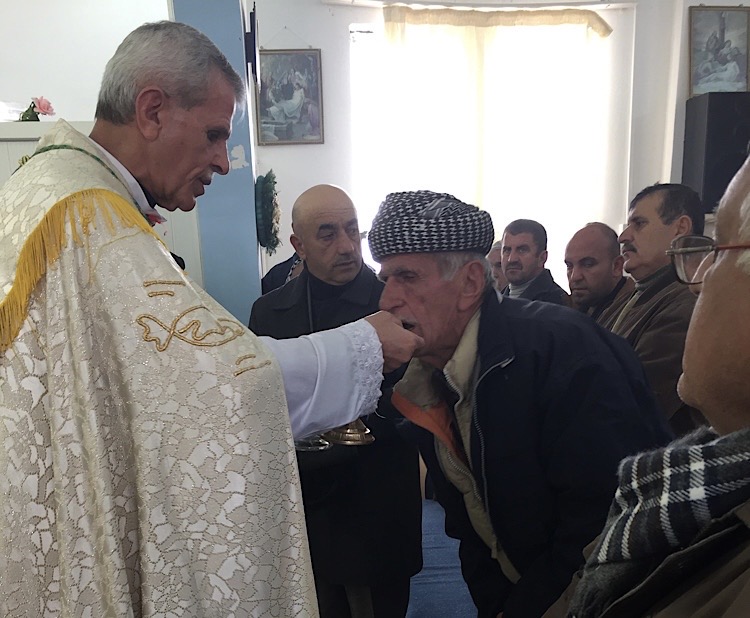Chaldean Church mourns Msgr. Rabban, man of dialogue beyond violence
After a long illness, the prelate emeritus of Dohuk in Kurdistan passed away yesterday in hospital. His physique was marked by an assassination attempt to which he had fallen victim in 2003, but that had not shaken his vocation for encounter and confrontation. A Muslim family affectionately called him "my uncle bishop." From international school to Isis refugee, a life spent serving the Kurdish community.
Milan (AsiaNews) - The Chaldean Church and the Kurdish and Muslim authorities in Iraq, especially in the Kurdish region of the North, mourn the passing of Msgr. Rabban al-Qas, bishop emeritus of Dohuk (even before Amadiya and Zakho), who died yesterday in hospital at the age of 74 after a long illness.
The prelate's life is inextricably linked to the tragedies that have marked the Kurdistan region, from the reign of terror of dictator Saddam Hussein to war and Islamic fundamentalism, ending up himself the victim of an extremist attack at the end of 2003. He was victim of a bomb explosion that affected his health, but never affected his missionary commitment and zeal.
In the dark years of the invasion of the Islamic State (IS, ex Isis) in Mosul and in the plain of Nineveh, mgr. Rabban has spent himself on behalf of Christian and Muslim refugees. He has always maintained and cultivated a strong bond with the Islamic religious and civil authorities of the area with whom he has worked to maintain and strengthen a climate of dialogue and trust, in some cases of deep friendship.
The funeral of Msgr. Rabban are taking place this morning in the native village of Komane, in the district of Amadiya, governorate of Dohuk, where he was born in 1949. Despite his illness (he suffered from Alzheimer's), the prelate has always distinguished himself in his mission for his vocation to interreligious dialogue and coexistence in a region marked by violence and conflict. A role recognized by the local authorities themselves, including the Prime Minister of Kurdistan Mesrûr Barzani who in a letter of condolences defined him as "a patriot" and active promoter "of the culture of peaceful coexistence between the different communities".
President Nechirvan Barzani remembers him as "an important Christian and an enlightened mind" who worked throughout Kurdistan. “He was an important religious and social figure, who served religious, educational and cultural matters with dedication. He was a strong defender of Kurdistan, of peaceful coexistence and solidarity in the region, in Iraq and around the world."
The priestly ordination of Msgr. Rabban dates back to 1973, then in 2002 his appointment as bishop of Zakho and Amadiya, followed by his transfer in 2020 to Dohuk, where he remained for only one year before resigning due to the progressive worsening of his health conditions. The attack suffered in 2003 had already undermined his spirit, but not his morale and enthusiasm in his vocation as priest and bishop.
Interviewed by AsiaNews while he was still in hospital in Rome for medical treatment following the explosion that had hit him, the Kurdish prelate commented on the arrest of Saddam Hussein using the metaphor of the "smashed snake head". They were the first stages of the US invasion which would later mark the future history of the country and the capture of the dictator was still "a joy for all Iraqis". However, he did not hide his fears for a possible escalation of violence that has bloodied the nation and its inhabitants in the years to come, also due to the lack "of a strong government" as the prelate had hoped to ensure stability.
In 2004 he had personally supervised the opening of the International School of Dohuk, the first English language school in the area after the fall of the former dictator. A reality, the bishop underlined at the time, "designed to give hospitality to the young people of the villages. For this there are student accommodation. Our idea is to offer this school free of charge to everyone”. The school, in agreement with the education minister, had decided to use English and French for all scientific and philosophical subjects, "to facilitate Iraq's integration into the international community".
In early January 2015 Msgr. Rabban had guided the then director of AsiaNews Fr. Bernardo Cervellera and the author of this article - he was a great friend and supporter of our agency - in visiting the refugee camps that had welcomed Christians, Muslims and Kurds in the first months of the ISIS tragedy. It was the first phase of the advance of the jihadist reign of terror, the dream of the Caliphate seemed to be able to come true with al-Baghdadi's men who had come to occupy almost half of the territories of Syria and Iraq. In the same days the terrorist attack in Paris also took place, triggering the refusal of coexistence with Muslims.
On the evening of January 9, the prelate "accompanied us to present condolences to a Muslim family of Komane" gathered to bid a last farewell to a relative. Kurds whom the bishop had known since the 1970s, having welcomed and helped them after they had spent years in prison under Saddam and then had been driven out of Baghdad. Years later their gratitude was still "great" and the youngest of the family, despite being Muslims, affectionately called him "my uncle bishop".
One of the sons of Hassan, the then head of the family, describing the tragedy of Isis said: "Our Islam is non-violent, it is a friend of Christians: look how we love each other with the bishop and with his community. Among the people who came today to offer their condolences, at least half are Christians".
These words, from a young Muslim, better than any celebration encapsulate the work and mission of Msgr. Rabban for Kurdistan, for Iraq, but above all for the Chaldean Church and its Christians.
07/02/2019 17:28







.png)










